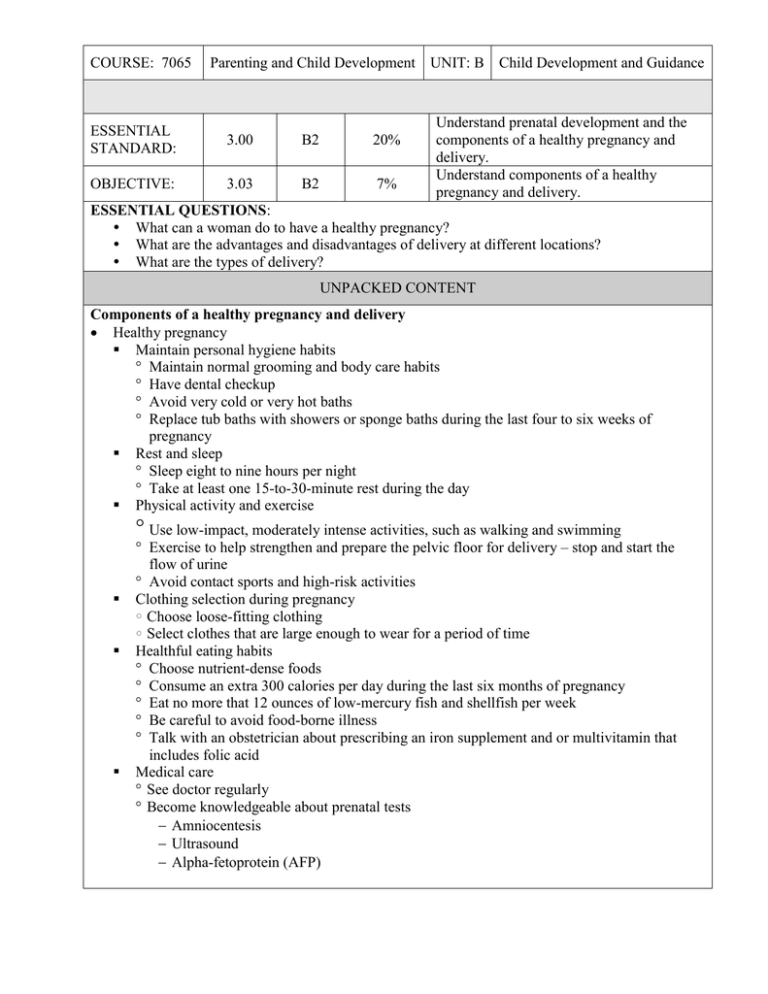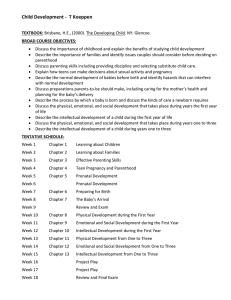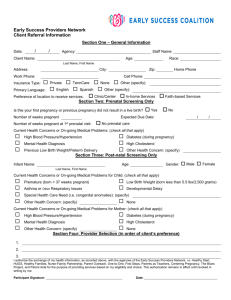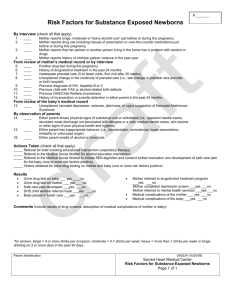COURSE: 7065 Parenting and Child Development UNIT: B Child
advertisement

COURSE: 7065 Parenting and Child Development UNIT: B Child Development and Guidance ESSENTIAL STANDARD: 3.00 B2 20% OBJECTIVE: 3.03 B2 7% Understand prenatal development and the components of a healthy pregnancy and delivery. Understand components of a healthy pregnancy and delivery. ESSENTIAL QUESTIONS: What can a woman do to have a healthy pregnancy? What are the advantages and disadvantages of delivery at different locations? What are the types of delivery? UNPACKED CONTENT Components of a healthy pregnancy and delivery Healthy pregnancy Maintain personal hygiene habits ° Maintain normal grooming and body care habits ° Have dental checkup ° Avoid very cold or very hot baths ° Replace tub baths with showers or sponge baths during the last four to six weeks of pregnancy Rest and sleep ° Sleep eight to nine hours per night ° Take at least one 15-to-30-minute rest during the day Physical activity and exercise ° Use low-impact, moderately intense activities, such as walking and swimming ° Exercise to help strengthen and prepare the pelvic floor for delivery – stop and start the flow of urine ° Avoid contact sports and high-risk activities Clothing selection during pregnancy Choose loose-fitting clothing Select clothes that are large enough to wear for a period of time Healthful eating habits ° Choose nutrient-dense foods ° Consume an extra 300 calories per day during the last six months of pregnancy ° Eat no more that 12 ounces of low-mercury fish and shellfish per week ° Be careful to avoid food-borne illness ° Talk with an obstetrician about prescribing an iron supplement and or multivitamin that includes folic acid Medical care ° See doctor regularly ° Become knowledgeable about prenatal tests Amniocentesis Ultrasound Alpha-fetoprotein (AFP) OBJECTIVE: 3.03 B2 Understand components of a healthy pregnancy and delivery. UNPACKED CONTENT 7% Delivery location options Advantages and disadvantages of choosing different locations for delivery ° Home delivery---only for uncomplicated births, might run into complications ° Birthing room delivery---more home-like atmosphere, have to go home within 24 hours ° Standard hospital delivery---insurance companies cover at least 2 days, high cost Advantages and disadvantages of natural childbirth---less sedation, can run into unexpected complications ° The Lamaze method---can control pain, have to take time to go to classes ° The Leboyer method---makes the birth less shocking and more comfortable for the baby, fit classes into schedule Advantages and disadvantages of personnel to assist with deliveries ° Obstetricians specialize in the care of mothers and babies both before, during and right after birth; expensive ° Family doctors provide prenatal care and deliver babies; complications can be above the doctor’s skills ° Licensed midwives assist women in childbirth; complications can be above midwife skills Healthy Labor and Delivery Watch for signs of labor ° Lightening when the baby drops lower into the pelvis ° During effacement the cervix becomes thinner ° The cervix dilates or widens ° A pinkish discharge called “show” comes from the vagina ° Amniotic sac ruptures ° Contractions begin by tightening and relaxing of the uterus muscles Types of delivery Vaginal Stages of labor ° Pre-labor---signs of labor appearing Mother may feel a burst of energy Mucous plug becomes loose (also known as “bloody-show”) Amniotic sac may break ° First stage of labor---cervix dilates Contractions come every 15 or 20 minutes – Full dilation will measure 10 centimeters in width ° Second stage of labor – the baby is born Cervix fully dilated, mother is allowed to move around freely Lasts from 20 minutes to two hours Pelvic and vaginal area scrubbed Typical birth, baby travels down the birth canal head first and facing toward the mother’s back Doctor may make a surgical cut called an episiotomy to widen the opening Cuts the umbilical cord when the baby is delivered OBJECTIVE: 3.03 B2 7% Understand components of a healthy pregnancy and delivery. UNPACKED CONTENT Stages of labor, continued ° Third stage of labor – placenta is delivered Mild contractions separate the placenta from the uterine wall and it moves into the vagina Nurse massages the abdomen of the mother, usually takes 10 to 30 minutes Mother pushes to expel the placenta Cesarean Reasons for Cesarean delivery ° When the labor is not progressing fast enough and a problem develops ° Baby in distress or turned in the wrong direction (breech birth) ° Multiple births Procedures for Cesarean delivery ° Perform surgical procedure ° Moved to recovery ° Walk as soon as possible ° Recovery up to six weeks Examining the Newborn Apgar Scale – scale zero to two, checked at one minute, and again at five minutes – normal total score is six-to-ten range. Ten is a perfect score. ° Appearance ° Pulse ° Grimace (Reflex irritability) ° Activity ° Respiration Nurse’s check ° Weight ° Measurement ° Dry off ° Apply antibacterial drops or ointment ° Injection of vitamin K to prevent bleeding disorder





